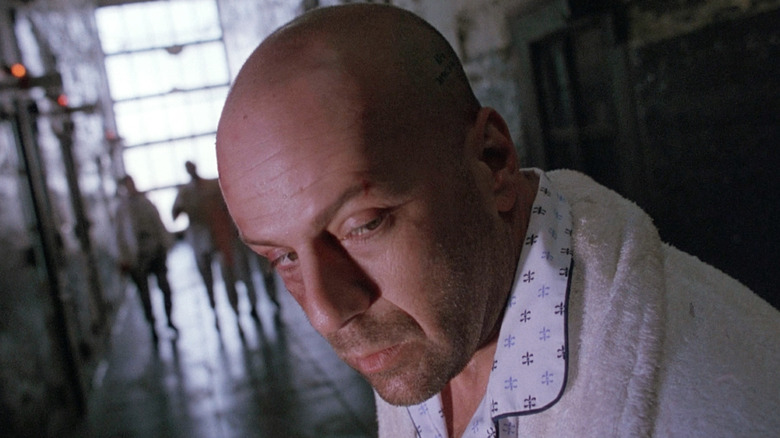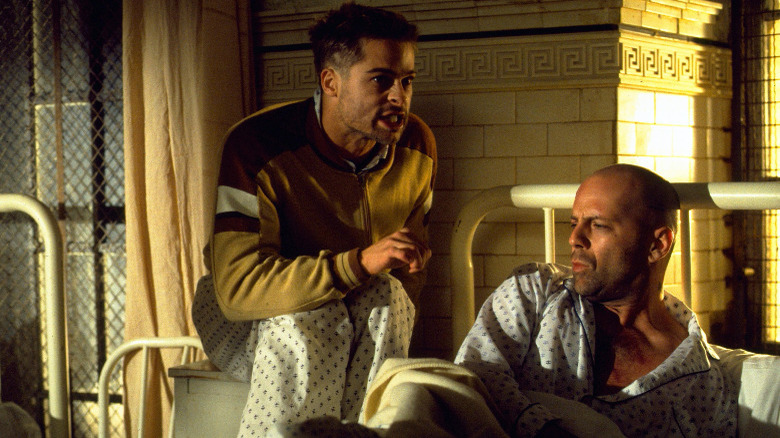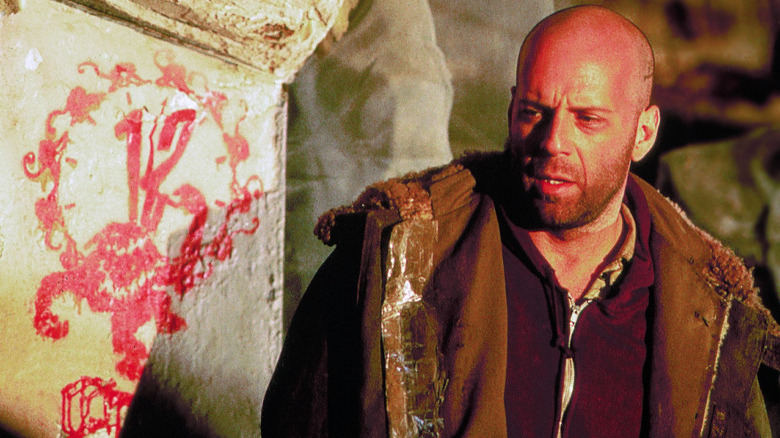Bruce Willis Worried His 'Baggage' Would Bring Down 12 Monkeys
Everyone knows Bruce Willis the action movie star, the actor famed for playing stubborn, wise-cracking heroes in the "Die Hard" film series, "The Fifth Element," "Armageddon," and so on. Lesser-known or, perhaps more accurately, lesser-appreciated, is Bruce Willis the character actor, the star who portrayed a Vietnam War veteran with PTSD in the movie "In Country," a dispirited child psychologist and security guard in, respectively, "The Sixth Sense" and "Unbreakable," and a worn-down police captain in "Moonrise Kingdom," among other roles.
It was the latter who starred opposite Brad Pitt and Madeleine Stowe in the hit 1995 sci-fi movie "12 Monkeys." The film centers on Willis' character James Cole, a prisoner in the year 2035 who is selected by his overseers to travel back in time to the 1990s and uncover the origins of a virus that would go on to kill all but one percent of the human population. As you might expect, James has far more in common with the troubled, alienated protagonists Willis played in his collaborations with M. Night Shyamalan than any of his action movie roles.
With Terry Gilliam ("Monty Python and the Holy Grail," "Brazil") calling the shots from a script inspired by Chris Marker's mind-bending experimental 1962 short film "La Jetée," it's little wonder "12 Monkeys" emerged as one of the least conventional mainstream sci-fi movies of the '90s (in a good way, mind you). It also did a fine job of subverting Willis' action star persona at a time when the actor was concerned his involvement could end up hurting the film's potential.
'It was an interesting experiment'
Prior to "12 Monkeys", Terry Gilliam had only just worked with proper Hollywood A-listers for the first time on 1991's "The Fisher King." Even then, the film's stars, Jeff Bridges and Robin Williams, weren't really the celebrities that Bruce Willis and Brad Pitt were in the early 1990s. "It was an interesting experiment just working with big stars," said Gilliam, speaking to the Kentucky New Era in 1995. He continued:
"Both Brad and Bruce were trying to do something they don't normally do. I liked the idea of changing the audience's idea of what these guys were capable of ... I [told Willis], 'You've got to come here basically naked; you can't come with all the entourage, the trappings of the superstar. This character [James] is basically alone; that's his nature.'"
Gilliam went on to praise Willis, stating he "worked his ass off" to fully embody his "12 Monkeys" character and avoid doing a mere riff on John McClane. The director was already partial to the actor, having very nearly cast him in Bridges' role in "The Fisher King." Still, for as much as the pair had gotten on before, Gilliam said Willis was wary about joining "12 Monkeys":
"Bruce was concerned whether the baggage he brought to the film was going to be detrimental to it and in some ways a dangerous thing. People who come for a Bruce Willis film are going to be disappointed because they are not going to get what he normally delivers. He was desperately feeling he wanted to escape the trap of success."
Trapped by the past
Far from harming it, Bruce Willis' grounded performance (one of his best) is the glue that keeps "12 Monkeys" firmly together. His portrayal of James is that of a loner whose journey back in time takes a heavy toll on his already fragile state of mind. He knows he can never change the past ("How can I save you? This already happened," he tells a group of skeptical psychiatrists upon accidentally being sent back to the year 1990), yet he can't help but hold onto the desire to try and do so anyway. The film goes on to make the idea of being trapped by your own past very literal, and it's a feeling that Willis was undoubtedly able to relate to coming into the movie.
Sure, Brad Pitt would be the actor to land an Oscar nod for his performance in Gilliam's film — a matter he's confessed to having mixed feelings about — but it's Willis' turn as an everyman struggling to retain his wits in a topsy-turvy world that's really stood the test of time. (It's a big 2022 mood, for sure.) Having escaped the "trap of success," as Gilliam put it, Willis would go on to do some of his best-known work as a character actor in the years that came after, proving he was always capable of playing more than a catchline-spouting "cowboy" on the big screen.


